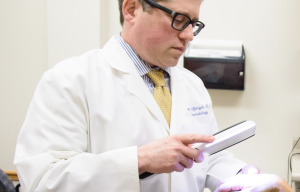
Dr. Kent Aftergut, MD
Provide Feedback
Medical Expertise of Dr. Kent Aftergut, MD
Diagnosis and treatment of skin conditions, including acne, eczema, rosacea, psoriasis and skin cancer.
About Dr. Kent Aftergut, MD
Kent Aftergut, MD is board certified in Dermatology by the American Academy of Dermatology and a native Texan. He is currently a Clinical Instructor of Dermatology at the University of Texas Southwestern Department of Dermatology, teaching the residents at Parkland Hospital on Friday afternoons. He served as President of the Dallas Dermatologic Society from 2009 to 2010.
Dr. Aftergut graduated magna cum laude from the University of Texas. He attended the University of Texas Southwestern Medical School in Dallas where graduated with honors and membership in Alpha Omega Alpha, an honorary medical society. Dr. Aftergut then completed an internship in internal medicine at Baylor University Medical Center in Dallas, Texas, prior to completing his residency in Dermatology at the University of Texas Southwestern Department of Dermatology.
Dr. Aftergut's professional interests include infectious disease, psoriasis, skin cancer detection and treatment, surgical and cosmetic dermatology. Dr. Aftergut was part of a team of local dermatologists that discovered the first nine reported cases of a rare infection called leishmaniasis acquired in North Texas.
Patient Education Resources
Psoriasis is a chronic skin condition that causes red, scaly patches on the skin. It affects about 2-3% of the population. People with psoriasis are at an increased risk of developing a form of arthri...
The best treatment for warts will depend on the type and location of the wart, as well as the patient's overall health and preferences. Some common treatment options for warts include:Salicylic ac...
Facial rejuvenation refers to a variety of cosmetic treatments that are designed to improve the appearance of the face and make it look more youthful. These treatments can include a combination of non...
Botulinum toxin is a type of neurotoxin that is used for a variety of cosmetic and medical purposes. There are several different types of botulinum toxin available on the market, each with their own u...
Treatment for psoriasis on the scalp typically involves a combination of topical and systemic therapies.Topical treatments include:Shampoos containing salicylic acid, coal tar, or sulfur, which can he...
Education & Training
- Residency: University of Texas Southwestern Medical School
- Internship: Baylor University Medical Center
- Medical School: University of Texas Southwestern Medical School
